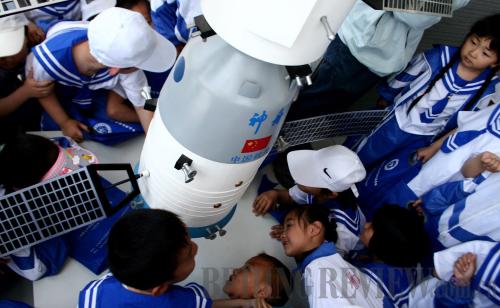|
 |
|
INSPIRING BOAT: Primary school students observe a model of Shenzhou spaceship in the Dalian Institute of Chemical Physics of the Chinese Academy of Sciences in 2007 (XINHUA) |
The Guanghua Science Popularization Education Foundation (GSPEF), China's first public welfare science popularization education foundation, was established in Beijing on January 22.
The foundation was founded by some organizations and individuals who are dedicated to popularize science in China, under China Guanghua Science and Technology Foundation (CGSTF).
On the same day, Shanghai United Gene Group (SUGG) donated 3 million yuan ($439,238) and materials of 2 million yuan ($292,826) to the foundation.
"Today, science popularization is an undertaking as important as science itself is," said Qin Yilong, President of SUGG and a professor with the Shanghai-based Fudan University.
SUGG was founded by professors and students of the School of Life Sciences of Fudan University in 1998. In 12 years, the group successfully developed China's first DNA chip research, set up China's first large-scale human genome database and gene detection technology and service system, and carried out large-scale gene detection services for medicine. Besides its business, the group also pays a lot of attention to the popularization of science.
"In daily life, many pseudoscientific tricks can be seen through by people with a little scientific knowledge, but unfortunately some people will still be duped. So I think popular science education must be strengthened," Qin said to Beijing Review.
He said it was also beneficial for hi-tech enterprises to expand their business by popularizing science and improving the science literacy of the public.
"People always want to predict their own future, including their health. In the past, there were no good scientific means so some people went to fortunetellers. But today, genomic medicine provides us advanced methods. By researching gene defects, we can predict a person's future health. These all depend on people's understanding and knowledge of genes and further developing popular science education," Qin said.
Pan Ping, Deputy Secretary General of CGSTF, said that with the rapid development of Chinese economy and society, popular science education will be an important way to further promote social development and improve peoples' lives.
The CGSTF is a charitable foundation registered in the Ministry of Civil Affairs and a part of the Central Communist Youth League. The establishment of the foundation was to help Chinese youth with their science learning. The foundation's business includes organizing public activities, establishing public welfare foundations, offering financial help to and rewarding organizations and individuals who make outstanding contributions in the field, organizing and financing programs promoting youth science and technology training such as research, seminars, technology cooperation in China and abroad, and receiving donations from organizations and individuals.
Since 2004, its business has expanded from honoring awards for contributions to science and technology to book donation, innovation in science and technology, supporting poverty-ridden areas with technology, popular science education and energy and environmental protection.
On January 22, the newly established GSPEF started its first project, a series of popularization activities with a theme of "Science Promotes Development and Education Changes Society." The activities emphasized low-carbon economy, clean energy, energy saving and emissions reductions, food safety, biological gene and health management, advocating the setting up of a resource-saving and environmentally friendly society and helping people to form scientific and healthy living and working styles.
In 2010, the foundation is putting 3 million yuan ($439,239) into special funds, aiming to introduce popular science education into thousands of communities in China.
"Popular science education needs participation from all sectors of society. We hope to gather together manpower, financial and material resources and intelligence from all areas to develop popularization by welfare methods," Pan said.
"China's popular science education has lagged behind the development of economic society because of many different factors. As the country with the largest population in the world, China must consider popular science education an important, if arduous, strategic task," he said.
It is especially important for children to receive popular science education during their growth period, Chinese educationists hold.
Wang Zhikun, former President of Beijing Normal University, said, "Many adolescents are interested in science, but they have no extra time to study it or even to read science books because of the pressure to enter a higher school."
Besides, Li Daguang, professor with the Department of Social Sciences of the Graduate University of Chinese Academy of Sciences, said that different methods need to be used to popularize science to different groups of people.
"A vegetable farmer may only care about their vegetables and prices but care little about the importance of scientific cultivation," Li said, "They do not know that harvest is closely related to the environment, water resorces and other factors."
In the past 20 years, Li has done a lot of research into Chinese citizens' science literacy. "I find that Chinese people always support the development of science and technology but their grasp of science knowledge is still at a low level. In fact, most Chinese people are interested in information about science and technology, even newly developed technology, but there are inadequate channels for them to get information," he said. The number of science and education channels of China's television stations dropped to 10 from 23 in 2001, and most of the replacement programs were not related to science, according to him.
"Today, we should focus on helping people get enough information on science and understand the relations between the development of science and their own lives," Li said, "and it will be more effective if people understand science from their own experiences and needs." | 